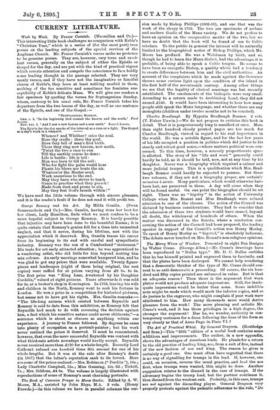Charles Bradlaugh By Hypatia Bradlaugh Bonner. 2 vols. (T. Fisher
Unwin.)—We do not propose to criticise this book in detail. That it is preposterously long is manifest at once. More than eight hundred closely printed pages are too much for Charles Bradlaugh, viewed in regard to his real importance in the world. He was a notable figure, and for the last few years of his life occupied a position in politics which did justice to his sturdy and robust good sense,—where matters political were con- cerned. To this time, however, a scarcely proportionate space is allotted. The story of his " life and work " generally could hardly be told, as it should be told, now, not at any time by his daughter. Never was a biography which required a calmer and more judicial temper. This is a qualification which Mrs. Brad- laugh Bonner could hardly be expected to possess. But these two volumes, if they are not a biography proper, are certainly memoires d servir. Many particulars, which would otherwise have been lost, are preserved in them. A day will come when they will be found useful. On one point the biographer should be set right. There was no " bigotry" in the action of University College when Mrs. Besant and Miss Bradlaugh were refused admission to one of the classes. The action of the Council was dictated by business considerations. They had to consider that the admission of these two students would have caused, beyond all doubt, the withdrawal of hundreds of others. When the matter was discussed in the Senate, where a resolution con- cerning the action of the Council had been proposed, the leading speaker in support of the Council's action was Henry Morley. To speak of Henry Morley as "bigoted," is absolutely ludicrous. The debate never touched on Mrs. Besant's non-religious opinions.








































 Previous page
Previous page